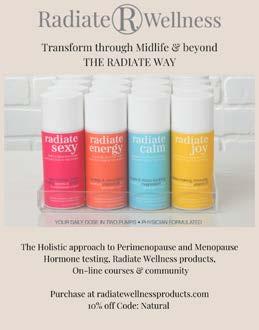
1 minute read
Radiate Wellness HRT Line

Helps Women Look and Feel Their Best
Advertisement
Radiate Wellness helps women radiate through perimenopause and menopause with clean, affordable products. It is locally women-owned and operated, and they know health and wellness isn’t one size fits all. Radiate Wellness helps women navigate the changes of midlife with a holistic approach through mind, body and spirit. They have helped thousands of women through their perimenopause and menopause journey.
They understand women’s struggles with frustrating weight gain, brain fog, drop in libido, and how women often experience disappointment in the way they look and feel. They feel stress and anxiety they have never experienced. Radiate Wellness products give women access to over-the-counter hormone replacement therapy (HRT) and supplements women need most.
Radiate Wellness is physician formulated by a world-renowned hormone doctor in easy-to-use transdermal creams. These creams are absorbed through the skin, resulting in better and more even absorption. They bypass the digestive tract, minimizing gastrointestinal upset. They feel like your favorite body lotion and are applied to thin-skinned areas for maximum absorption, retailing from $38 to $42.
The Radiate Wellness HRT line includes Radiate Balance—a top-rated natural bioidentical progesterone with vitex to ease the symptoms of premenstrual syndrome, perimenopause and estrogen dominance— and Radiate Vitality—the best-selling and most affordable combo of progesterone and bio-est (estriol and estradiol) cream on the market for menopausal women. The line also includes supplements.
For complete details and to shop, visit RadiateWellnessProducts.com. See ad on this page.
Seniors Avoid the Hospital With Nature
New research has found that exposure to natural environments may reduce the risk of hospitalization for older adults with Alzheimer’s disease, related dementias and Parkinson’s disease. The cohort study included approximately 62 million Medicare beneficiaries aged 65 years or older that lived in the contiguous United States from 2000 to 2016. Researchers looked at ZIP-Code-level greenness, percentages of park cover and blue space (water) cover, as well as hospitalizations. They found that exposure to greenness, park cover and blue space cover reduced hospitalizations for patients with Parkinson’s. Greenness—but not park or blue space cover—was associated with a lower risk of hospitalization due to Alzheimer’s disease and related dementias.





